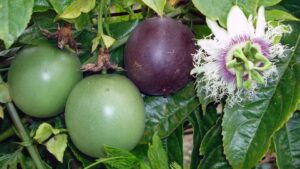Passiflora Edulis (Maracuja – Passion Fruit)

Passiflora edulis Sims is a plant of the Passifloraceae family, native to South America. In Italy it is known as FRUIT OF PASSION or, alternatively, MARACUJA.
The appellative “passion fruit” does not refer to any aphrodisiac properties but, it is so called because some elements that make up the flower recall the crown of thorns and the nails of the crucifixion, symbols linked to the Passion of Christ. Being an originally tropical plant, used to living in conditions of extreme heat and high humidity, its selection for the home environment must be done with extreme care. Passiflora edulis is a climbing plant, which is why it is preferable to grow it in a pot always accompanied by a support, be it wooden or a net specially installed on the entire profile of the pot.
GROUND
Passionflower is a tropical plant and loves the heat. This is why it has adapted well to the temperatures of our Center-South.
To plant the passiflora edulis in the open ground, make sure that the soil is well drained, to avoid stagnation, and must be rich in organic substances and very soft. Passiflora edulis can be grown in pots, provided that terracotta pots are used to ensure good thermal climate. Since these are climbing plants, it is necessary to arrange support structures, trellises, trees, or walls, to allow the plant to stretch in height.
FLOWERS AND FRUITS
The flowering of Passiflora Edulis, occurs in the summer period, is a plant much appreciated by bees, for the large quantities of nectar contained in the flowers.
The flowers are the most beautiful part of this plant, they have a symmetrical shape with rays, they are solitary and their receptacle is enlarged in the shape of a bell.
The fruits of the passionflower are ovoid and elongated berries, covered with a light integument. This, when fully ripe and depending on the species, is colored purple, blue, yellow or black. Inside the fruit there is a gelatinous pulp that covers the small seeds. These are flattened in shape, dark and hard.
Fruiting occurs after flowering, usually in autumn.
USE AND HEALTHCARE CONTENTS
The nutritional properties of passion fruit or maracujá are very interesting, for this reason, passionflower has several uses in phytotherapy. They range from the treatment of anxiety to insomnia. More rarely it is used to relieve gastrointestinal disorders of psychosomatic origin. Frequently, in herbal medicine it is mixed with other plants with the same type of sedative properties, such as valerian. Passionflower is sold in different forms, such as tablets, mother tincture, herbal teas and infusions. The fresh fruit, particularly digestible, is intended, in addition to direct consumption, for the preparation of jams, sauces and desserts (often also for ornamental purposes), liqueurs and other alcoholic beverages. Some by-products of industrial processing, such as the skins and the woody portion of the seeds, are used, respectively, for animal feed and oil extraction.
PRUNING AND COLTURAL CARE
Passiflora edulis needs a good fertilization, to be carried out throughout the vegetative period, therefore from March to October, it needs regular and abundant watering. Irrigation must be carried out throughout the vegetative period from spring to early winter. In winter it is necessary to suspend watering to prevent the water from freezing to ruin the roots. Much attention must be paid to the quality of the water, especially for potted plants, it is better if you water it with rainwater.
